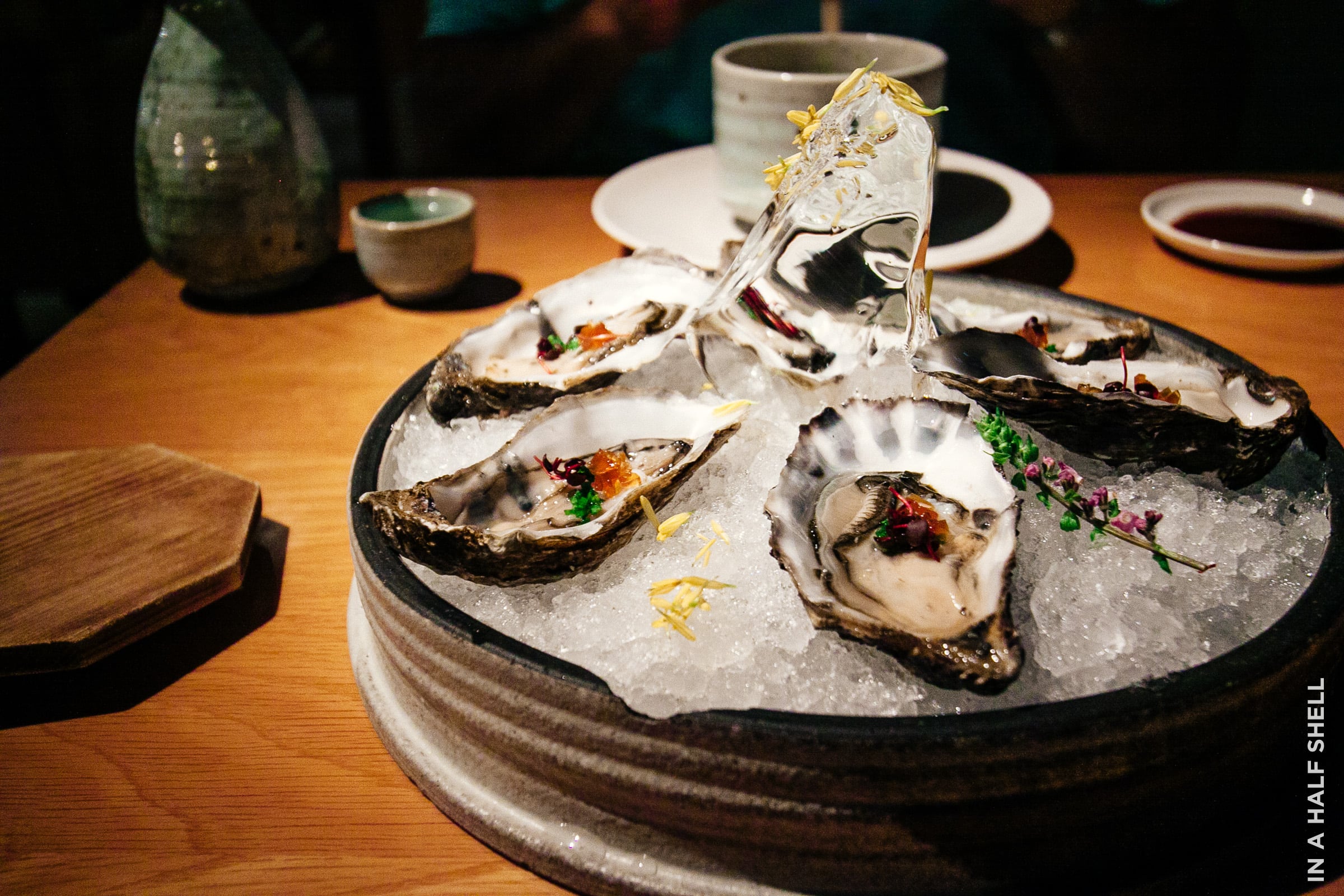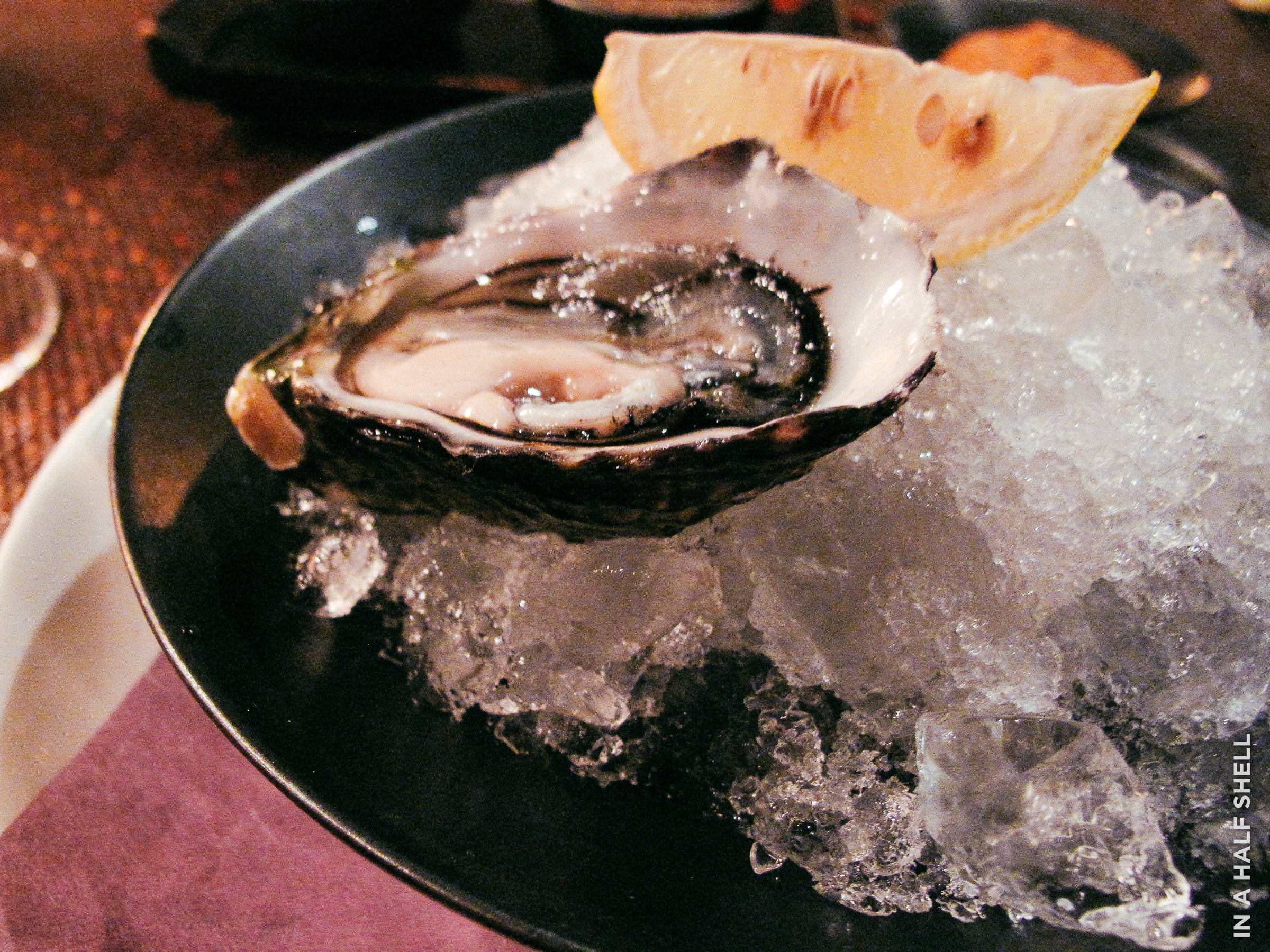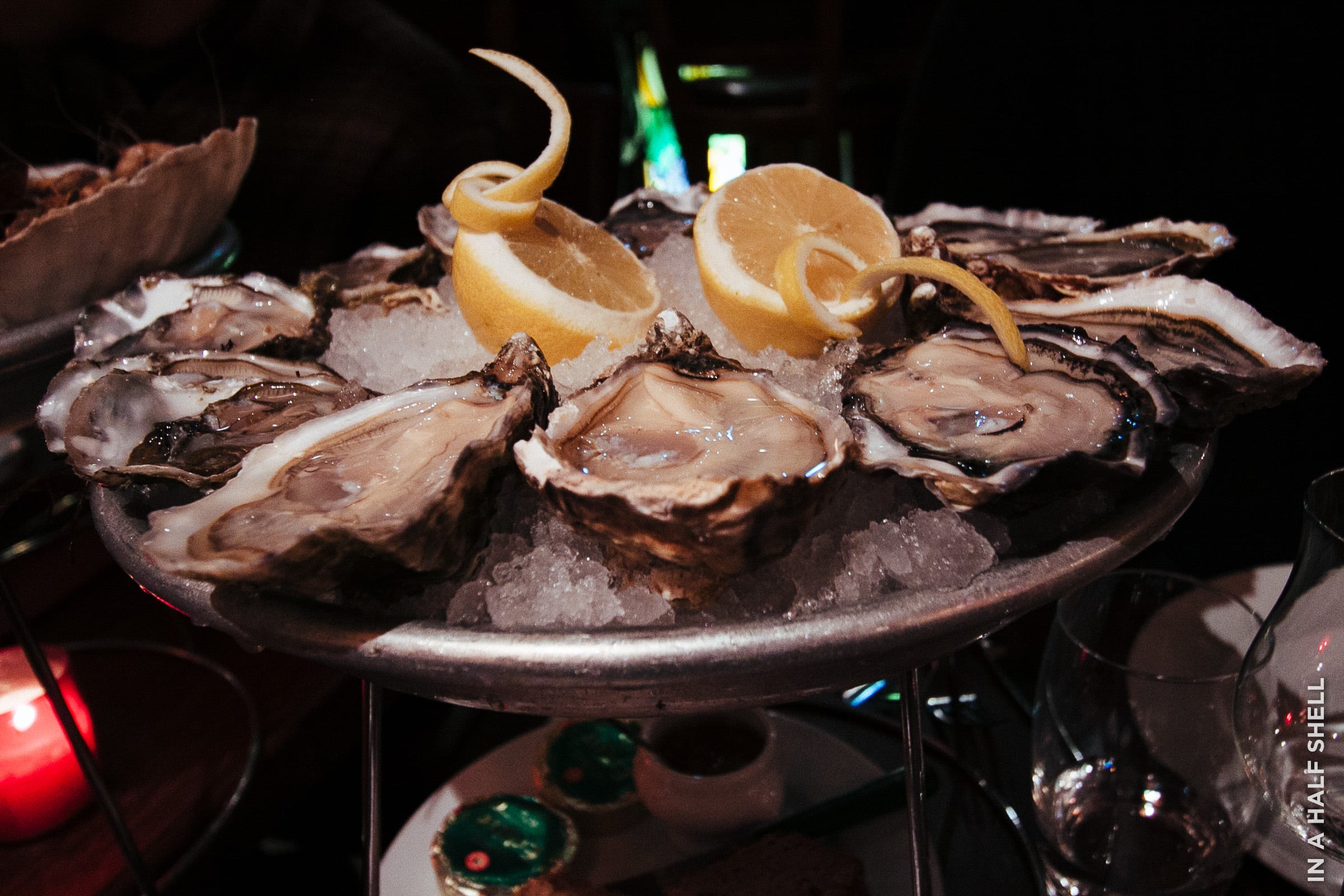My Epic World Oyster Tour
We are in peak oyster season and I haven't stepped foot into an NYC raw bar yet! Truth is, I've been traveling a lot... like, a whole lot for business.
Let me be clear: this was a once in a lifetime opportunity. International business travel on a flexible schedule and no adult supervision (besides my very chill research colleague). So what do I do? Well, I've been seeking out the local oyster bars during my spare time.
17 cities, 14 countries, 5 continents
Inspired by Peter Jon Lindberg’s oystourism article for T+L about a year ago, my goal was to conduct my own world oyster tour and sample oysters in every city that I visited... assuming that they eat oysters! 17 cities, 14 countries, 5 continents. Let’s go!
LONDON, GREAT BRITAIN
Bentley's Oyster Bar & Grill
My experience at Bentley's was fantastic. The shucker-slash-chef noticed my abundant enthusiasm for the oyster and offered up some lovely Spanish white wine (2009 Rias Baixas from Bodegas Terras Gauda) to pair and crushed black pepper to spice up the flavor. For a first taste, I never season my oysters with anything, but I have to admit that a dash of black pepper was quite refreshing. It dimensionalized the salty liquor without masking the full flavor of the oyster like many other sauces would do.
The raw menu was divided into two groups: "Native" oysters (wild) and "Rock" oysters (farmed). A few of the oysters were further categorized by size. I learned that a No. 5 oyster is smaller than a No. 2. Largest oysters are No. 0 or 00 or even 000! The prices varied from 5 GBP ($8.14 USD) for three farmed oysters to 4.15 GBP ($6.70 USD) for a single oyster.
Raw Oyster Tasting Notes
West Mersea (No. 2), Great Britain flat shell, firm texture, burst of mineral flavor, salty ham finish
Loch Ryan (No. 3), Scotland: flat shell, bold and long-lasting metallic (zinc?) taste, abrasive finish
Loch Ryan (No. 1), Scotland: sweeter and milder than No. 3, slightly crunchy, miso soup aftertaste
Maldon Rock, Great Britain: ultra deep-cupped, rocky taste, slightly muddy, soft crunch
Jersey Coast, Jersey: deep-cupped, fantastic salty/umami aftertaste (like potato chips)
Kelly Galway, Ireland: flat shell, firm texture, rich & smooth, soy flavors, metallic finish
BRUSSELS, BELGIUM
Belga Queen Oyster Bar
This is my third trip to Brussels, but first time to Belga Queen. Thanks for the reco, Allie!
Belga Queen offered eight different oysters from France, one from the Netherlands and I ordered two of every kind. I was in heaven... until I was thrown a curve ball. In US restaurants, it is expected for the shucker to separate the oyster from its shell by cutting bottom adductor muscle. This way, the patron can slurp the oyster down in one swift and sexy motion. In Brussels, I quickly learned that this was not an international oyster serving protocol. All of the oysters on my platter were solidly stuck to their bottom shells.
I waved my waiter back and asked if this was a mistake. He looked at me with surprise. "No, no, no—Theeees not how we do eet in Bruxelles!" Then he proceeded to show me how to clumsily detach the oyster from the shell with a cocktail fork. I was slightly devastated, since there was no way to not puncture the delicate meat. That night, still distraught, I emailed author Robb Walsh of "Sex, Death & Oysters" about my experience. He promptly responded and said that this is how it's done in most of Europe. The rationale is that the oyster stays alive longer with one adductor muscle still attached. Wonderful. Despite the oyster massacre I had to overcome, they were extremely delicious. I wonder whether or not they would have been better if they were cleanly shucked.
Raw Oyster Tasting Notes
Belon (No. 5), France: petite, strong zinc taste, slightly chewy
Belon (No. 2): bold punch of savoriness, sweeter than the No. 5, flavor of zinc was still present
Fines de Claire: long, delicate, white flesh, the salty taste reminded me of soy sauce
Pousses en Claire: amazingly rich kelp flavors in a thinner meat, this oyster is quite rare/special
Normandy: deep-cupped, fat and meaty, slightly sweet, ripened cheddar cheese finish
Speciales Vertes: deep-cupped, clean, semi-sweet, and wonderfully chewy and textured
Perle Blanche: long, high salinity, clean, very straightforward
Gillardeau: large, semi-salty, nutty, clean
Zeelande, Netherlands: savory, sweet, seaweed flavors
HAMBURG, GERMANY
Rive Oyster Bar & Bistro
This is one of the most popular seafood restaurants in town. It is located on the harbor, a pleasant stroll from Landungsbrücken, part of Hamburg Harbor. It appears that oysters aren't all that popular in Hamburg, but other seafoods remain popular. I was able to try a few varieties, one being from Germany. The French oysters were clearly superior, followed by the Irish, then trailed by the German variety. Perhaps it was just a coincidence that their oysters were sub-par? Though, I still come away with the notion: "Stick with the bratwurst and lemonade beer while here."
Raw Oyster Tasting Notes
Bouzigues, France, Étang de Thau: flat, chewy like a grape, delayed saltiness, taste of watermelon rind
Donegal, Ireland: farmed gigas, creamy white meat, earthy and slightly nutty, soft texture
Sylter Royal, Germany, Sylt: slim and thin meat, mild flavors, semi-salty, one note
MOSCOW, RUSSIA
The Big Bolshoi
Next to the famous Bolshoi Theater sits this new opulent, high-end, Michelin-star vying restaurant. The seats were made of supple, cocoa leather. According to this review, Ralph Lauren had something to do with the decoration. It came as a "nearby" recommendation from the concierge and had quite a different feel from our first night's meal at Pushkin Cafe.
Perle Blanche, France: massive (nearly overflowing), crisp, creamy, sweet adductor muscle
HONG KONG, CHINA
Oyster Station and Mandarin Oriental Grill + Bar
After a 9-hour red-eye from Moscow to Hong Kong, my Jakarta flight ended up being canceled by Cathay Pacific. The airline put us up in the airport hotel, but I wasn't about to spend 15 hours there. So after a much needed nap, I met up with a few friends in the city. Coincidentally, Jeremy and Eric both enjoy oysters too and they knew just the spot to go.
Oyster Station is a small, 15-seat restaurant tucked away in SoHo (South of Hollywood). In addition to trying seven different beautiful bivalves, including my very first South African oyster, we also had crunchy geoduck sashimi and a pair of Tourteau (Sleepy) crabs. A male and female were both steamed and then chilled. The sweet meat was very enjoyable, but the roe and milt made the moment memorable. Especially watching the guys dig in as if they had no idea what they were eating.
Barron Point, Washington: fresh, little salinity, grain-flavored finish
Eagle Rock, Washington: minerally, deep flavors, soft butter-like texture
Namibia, South Africa: big, fat and creamy belly, nearly no salinity, punch of mineral flavor in back of throat
Tasmania, Australia: creamy, crisp, not sweet but has the ability to make other oysters taste sweeter
Speciales Gillardeau, France: enormous, tender, bold and rolling flavors, ultra sweet adductor muscle, packed with umami
Fines de Special, France: very mild, slightly acidic, no salinity
Kumamoto, “USA”: deep-cupped, plump, clean, hint of melon
A few days later... Back for more! After a rather exhausting work day, I thought the best way to de-stress and unwind was to slurp down my favorite food. Heralded as one of the world's best oyster bars, the Mandarin was certainly a place of fairytale bliss. The three-step amuse-bouche was elegant, charming, and oh-so-delicious. There was an international selection of maybe a ten, but the most interesting-looking one was sold out (from Denmark). Nonetheless, I managed to try a trio that were fantastic.
Whitley Bay, Great Britain: meaty but soft, balanced salinity, broth-like savoriness, slightly metallic
Smoky Bay, Australia: low salinity, faint copper tint, creamy inside with chewy skin, buttery
Galway Bay, Ireland: salty splash, pronounced steely-mineral flavors, jelly-like body, savory finish of seaweed
JAKARTA, INDONESIA
C's Steak & Seafood
Located conveniently in my hotel, this modern restaurant showcased a wonderful balance of East and West details. We came across an enormous collection of wine stacked floor to ceiling at the entrance. Then next to it were various tanks of live fish (for eating, not for show) just like how they do it in the biggest seafood restaurants in mainland China. The open kitchen had a handful of white-coated chefs and an occasional burst of flame. The restaurant offered three types of fresh oysters: American, French and Australian. I opted to just try half a dozen of the Australian variety as an appetizer.
Sydney Rock: plump, cylindrical, shrunken mantle (as if it were cold), bold, pungent, deliciously fishy
The night before, I also tried some grilled oysters at Gyu-Kaku. They sat in a round tin of savory broth and were cooked for a few minutes above a hot charcoal grill at the table. The texture was firm and the salty, savory flavors really popped. It had no trace of the sea, however, but still retained minerality and nuttiness.
SHANGHAI, CHINA
T8 (Closed)
I have never been disappointed at T8. In fact, it's probably my favorite non-family-style restaurant in Shanghai. The ambiance is chic and relaxing, the food is impeccably crafted, and the cocktail selection is creative and vast. They feature daily specials that make use of the chef's favorite fresh ingredients. On the night that I happen to drop by, they had an oyster on the menu—which I've discovered earlier this year is quite rare for restaurants in Shanghai to possess.
Tasmania, Australia: creamy, plump, chewy mantle, medium salinity, fruity, sweet and clean finish
TOKYO, JAPAN
Fish House Oyster Bar
Situated at a quiet intersection in Ebisu, a neighborhood in Shibuya ward and headquarters the Sapporo Breweries, this small restaurant was lively and bubbling with delicious smells of grilled fish, meats and beer. The oyster menu was nicely cataloged by location and seasonality. Each oyster was also pinpointed in red text on an outlined map of Japan.
They also showcased the "off-season" offerings in black font, just to give you an idea of what's available around the year. Note: I believe in Japan, they run all raw oysters through a purification process to ensure that they're free of bacteria and parasites. This may have attributed to the slightly bland taste in some of the oysters.
Hamaichi, Miyagi: little salt with a fresh, clean taste, hint of cucumber in finish, firm and chewy, beautifully striped shells
Uramura, Mie: bold and briny, the saltiness is balanced with a slight mineral aftertaste, recommended
Senpoushi, Hokkaido: creamy, balanced salinity, rich in umami (like dashi), recommended
Maruemon, Hokkaido: plush white belly, savory, medium brininess and a hint of sweetness, rather large (3 inch body)
Magaemon, Hokkaido: little salt, but has a delicate vegetal flavor, very large (3+ inch body) and provocative shape
Tryana Bay, Ireland: a delicious saltiness that leaves the mouth craving for sweet, seaweed flavor, slightly nutty
Caviar, Australia, Pambula Lake: immediate hit of metallic tang, smoky, beautiful black-tipped shells
Pittwater, Australia, Tasmania: buttery, savory, mouthful flavor, low in salt, slight vegetal finish
St. Helens, Australia, Malting Bay: mild flavors with little salt, slightly vegetal, does not taste of the sea
RIO DE JANEIRO, BRAZIL
Satyricon
Despite it being a coastal city, seafood is not particularly popular in Rio. After asking several sources, seafood restaurants are quite rare here. Even at Satyricon, the most well-known high-end seafood restaurant, they only offered one variety of oyster. The waters in Rio may not be well-suited for oyster production, due to temperature or pollution. However, in other parts of Brazil, oysters are abundant and delicious. My taxi driver happened to like oysters and he recommended them with a drizzle of lime. Sure enough, wedges of lime arrived with my platter of a half dozen and I tried them like a local. Oh man, it was delicious. I would highly recommend trying as such with saltier varieties.
Santa Catarina, Brazil, Rio Grande do Sul: very salty, balanced by sweetness, rocky minerality, plump, crisp, bean sprout flavor
PARIS, FRANCE
Chez Flottes (Closed) and Goumard
It seems as though one can not go wrong with getting oysters at any kind of establishment in the City of Lights. Oyster culture was alive and well here, despite being priced exceptionally high. At Chez Flottes, a traditional French brasserie near the Jardin des Tuileries, not only did they have fantastic oysters, but also a killer Foie Gras burger. The ambiance was low-key, warm, and tourist-friendly (merci). The oysters were kept chilled outside, in front of the restaurant, while a dedicated shucker kept guard, crafted wondrously decadent seafood platters and casually enticed passerby's to come in.
Goumard was more upscale and filled with chic (yet slightly older) Parisians. Unfortunately, the oysters weren't as carefully tended to. I found bits of shell in nearly every one, which was rather disappointing. Perhaps it would have been a different experience if we were downstairs at the oyster bar rather than in the upstairs dining room.
Raw Oyster Tasting Notes in Paris
Creuse de Bretagne (No. 5): small to med (1.5-2 inches), salty, rocky minerality, chewy dark beige meat
Speciales Gillardeau (No. 2): large (3 inches), extremely savory, jelly-like texture, balanced sweet/saltiness, clean finish
Belon (No. 2): petite and delicate meat, moderate salinity, metallic (coppery), woody and earthy
Speciales Gillardeau (No. 5): aka "butterfly" oyster, super sweet, savory; miso/dashi flavors, beautiful white flesh
Saint Vaast la Hougue: sharp and somewhat harsh brininess, adductor muscle was easily removed, slightly nutty, chalk finish
Fines de Claire: long, creamy white belly, delicate, more subdued than St. Vaast, crisp
DUBAI, UNITED ARAB EMIRATES
The Terrace at Park Hyatt Dubai and Zuma
It was "Brazilian night" at The Terrace, an outdoor marina-side lounge that overlooked Dubai Creek and the futuristic Burj Khalifa-spiked skyline. Tropical vodka-infused cocktails were the specialty tonight and an energetic/upbeat playlist of samba-electro tunes streamed throughout the venue. An indoor bar displayed a family of various shellfish, including dozens of beautiful oysters on a bed of crushed ice. I ordered myself a Mango and Coriander Spiced cocktail and half a dozen oysters to enjoy. The oysters were presented on an ice-like platter, but there wasn't actually any ice. Like in the EU, the bottom adductor muscles were left intact, but the jagged edges of all of the shells were also smoothed away to make handling a much more pleasant experience. Plus, the shucking was very well done as I didn't encounter any bits of shell in any of the six that I had.
Zuma is an international contemporary Japanese gastropub, which I have experienced before in London. The food is exceptionally well crafted that's balanced in boldness and subtlety. I didn't know it at the time of making the reservation, but it just so happened that their specials of the night were oysters! Oyster sashimi or tempura-- for me, that was a no brainer. The oysters (first photo at the top of post) arrived on crushed ice and garnished with ponzu, yuzu gelee, and spring onion. The flavor combination was sublime.
Fines de Claire (No. 2): long and slender, intense salinity, creamy white belly, more metallic than the Spéciales
Spéciales de Claire (No. 2): plump and succulent, sweet and a good balance of saltiness, earthy mollusk flavor
Prat ar Coum (No. 3), France, Brittany: firm white belly, soft and sweet, savory like miso soup, no liquor to be had
Places Where I Failed to Find Oysters
I wasn’t successful at finding oysters in every city that I visited. Here are the ones where raw bivalves alluded me (and probably for the best).
Kuwait City, Kuwait
Doha, Qatar
Lagos, Nigeria
San Antonio, Texas















